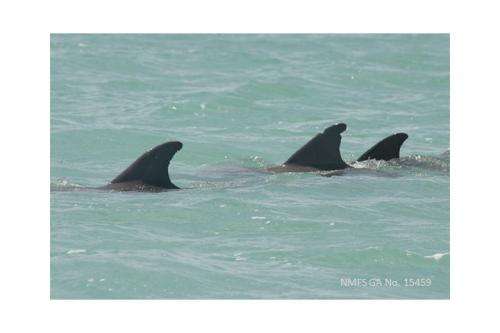Dolphins travelling in a group. Credit: NMFS GA No. 15459 (Jennifer Lewis)
Traveling into uncharted territory in search of food can be a dangerous undertaking, but some bottlenose dolphins may benefit by moving through their habitat with relatives who may be more experienced or knowledgeable. It turns out that leaders in bottlenose dolphin groups in the Florida Keys are more likely to be related to the dolphins that follow them, according to research published March 13 by Jennifer Lewis and colleagues from Florida International University.
In complex habitats like the shallow waters of the Florida Keys, individuals who follow may benefit from the experience of those that lead them, but the advantages to leaders are less obvious, as they must share food resources encountered with the group. In this study, the authors assessed indirect benefits to leaders in bottlenose dolphin groups, by measuring the chances of a leader being related to their followers. They found that when two dolphins shared a leader-follower relationship, their chances of being related were much higher than seen in dolphin pairs that associated in other ways.
Lewis adds, "These results are particularly interesting because bottlenose dolphins do not stay in the same groups all the time. In fact, they change over periods of hours or days. That specific pairings within these groups (according to their roles of leader and follower) does occur, suggests that these associations are not random and that individual choices are made about leaders."
More information: Lewis JS, Wartzok D, Heithaus M, Kru¨ tzen M (2013) Could Relatedness Help Explain Why Individuals Lead in Bottlenose Dolphin Groups? PLoS ONE 8(3):e58162. doi:10.1371/journal.pone.0058162
Journal information: PLoS ONE
Provided by Public Library of Science






















